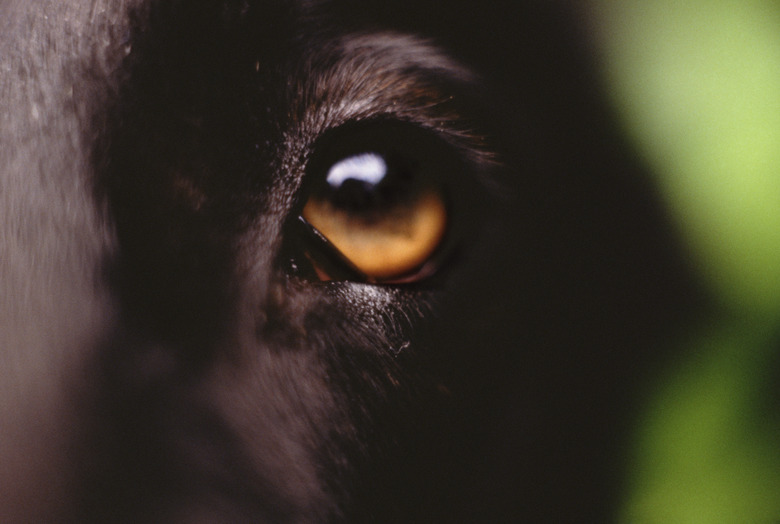Home Remedy To Cure An Eye Infection In A Dog
You may have woken up one morning and noticed that your pup's eye was a little swollen and red. Maybe you caught them scratching their face or holding their eye shut. They may even be visibly stressed and not sit down long enough to let you have a good look. This all could signal that your canine has an eye infection, and dog eye infection treatment can be tricky.
Eye problems always require a veterinarian visit because there are so many different causes. In fact, common so-called infections, like conjunctivitis, may not even be caused by an actual infection at all. Nonetheless, you have to know the underlying cause in order to cure it.
In the best-case scenario, your pup's eye infection may clear up with a simple home remedy and some time. Unfortunately, that's not the typical case. Most eye infections require medical intervention whether it's in the form of eye drops, ointment, or a course of oral antibiotics. Here's what you need to know about treating your dog's eye infection at home. Can home remedies ever work?
What does a dog eye infection or conjunctivitis look like?
What does a dog eye infection or
conjunctivitis
look like?
The first thing that typically comes to mind when anyone mentions an eye infection is pink eye, medically known as conjunctivitis. Though pink eye is commonly thought to be an infection, it's actually just the inflammation of the conjunctiva, which may or may not be due to an infection. Infection, however, is a common cause of conjunctivitis in humans and dogs alike. The conjunctiva covers the sclera (the whites of the eyes) and lines the inside of the eyelids.
Dogs may also experience uveitis, an infection of the interior portion of the eye. This is caused by inflammation in the iris and the ciliary body and choroid tissue (which are located behind the iris). Additionally, your pup could have inflammation in the cornea or abnormalities in their eyelids and tear glands.
Overall, inflammation makes parts of the eye appear pink or red and swollen. There may also be discharge that's cloudy, yellow, or greenish. If left untreated, eye infections could lead to vision loss or spread to other parts of the body.
Causes of a dog eye infection
Causes of a dog eye infection
Eye infections and inflammation have a lot of potential causes, which require different dog eye infection treatments. It could be a viral or bacterial infection or an allergic reaction (think: the red, itchy eyes you may get during allergy season). Your dog could also have a tear film deficiency caused by dry eye (also known as keratoconjunctivitis sicca); an eyelid abnormality; a dog-breed-associated condition, like nodular episcleritis (commonly found in collie breeds, spaniel breeds, and terrier breeds); or an eye abnormality. Additionally, conjunctivitis can be caused by trauma or irritation to the eye (like a scratch or smoke irritation) or obstructed tear ducts.
Since there are so many causes, eye infections require a veterinarian's diagnosis. They will do a complete physical exam, which includes an eye exam. They may also run tests on the affected eye(s).
Depending on the cause of the eye problems, typical home remedies for dog conjunctivitis may not be suitable. Your pup may need a prescription, like antibiotics. If not, you can talk to your veterinarian about the following home remedies.
Home remedies for eye infection in dogs
Home remedies for eye infection in dogs
One of the simplest home remedies for dog conjunctivitis or another form of eye irritation is a saline solution rinse. While it can't clear an infection on its own, it can help you gently remove discharge from your dog's eye and keep the area clean. It can also treat the underlying issue if your dog's symptoms are caused by dry eyes or irritation from a foreign object (like hair, dust, or pollen).
To try this method, you can get a saline solution from your veterinarian or purchase a commercial eye wash sold over the counter. They're made for humans but are safe for use in dogs. After consulting your veterinarian, administer the recommended dose into the corner of your dog's eye. You can also soak a soft cloth or tissue with the solution and wipe the area around the eye to clear away discharge. You can repeat this several times a day to keep your dog's eye clean and free of discharge.
Home remedies for dog eye discharge
Home remedies for dog eye discharge
Eye infections can be extremely uncomfortable. After consulting with your veterinarian, consider trying the following techniques to alleviate your pet's eye discharge, itchiness, and other symptoms.
Soothe your dog's eyes with a warm compress
Warm compresses aren't a surefire dog eye infection remedy, but they do help to ease your pup's symptoms and make them more comfortable. In order to use this method, soak a clean cloth in warm water. Ring it out until it's no longer dripping but still damp. Hold the cloth on your dog's eyes for five minutes.
You can use this method for both eyes but make sure to use a new cloth for the other eye and also for subsequent treatments. Using the same cloth on both eyes can cause an eye infection to spread.
Vitamins can give your dog a health boost
Vitamins are essential for proper immune system function, but they can also reduce inflammation, which causes the itchy redness in your dog's eye as they heal from their infection. Ask your veterinarian about vitamin C and E supplements. The typical vitamin C dose is 5 to 10 mg per pound per day, but it can vary from dog to dog. Not every pup is a good candidate, so proceed with caution. Too much vitamin C can cause diarrhea.
After consulting your veterinarian, you may want to switch to fortified dog food or give your pup some treats that have high levels of vitamin A, including fish liver oil, egg yolks, carrots, or sweet potatoes. Be careful to follow recommended dosages to avoid vitamin A toxicity.
Symptoms of eye infection in dogs
Symptoms of eye infection in dogs
Eye infections in dogs produce similar symptoms to eye infections in humans, such as:
- Pink or red eyes
- Redness and inflammation around the eyes
- Yellow or green discharge
- Watery discharge
- Foul odor
- Squinting and blinking
- Keeping the eye shut
- Pawing at or rubbing the eye
- Sensitivity to light
- Crusty buildup in the eye
- Tear staining on the face
Dog eye infection warning
Dog eye infection warning
There's not much scientific evidence that home remedies are effective cures for eye infections in dogs. Some people swear by them, but others see little difference. It's very important to consult your veterinarian because untreated eye infections can spread, causing vision loss. Also, a veterinarian has to rule out other eye conditions, like glaucoma or cancer, which may present similar symptoms.
If your dog is lethargic, lacks an appetite, has yellow or green pus or blood oozing from the infected eye, keeps the eye shut, or acquired the infection from trauma, seek a veterinarian's assistance for treatment immediately.
The bottom line
The bottom line
Dog eye infections and inflammation are relatively common in dogs and can arise from various causes, ranging from bacteria to irritation or breed-specific conditions. It is important to seek a veterinary diagnosis to determine the cause and appropriate treatment, especially because unaddressed infections can lead to permanent vision loss. Most dog eye infections are treatable with medicated eye drops or antibiotics. Few can be resolved with at-home remedies alone, but home remedies might help alleviate your pet's symptoms and accelerate healing while you're waiting for your pet's veterinary appointment.



